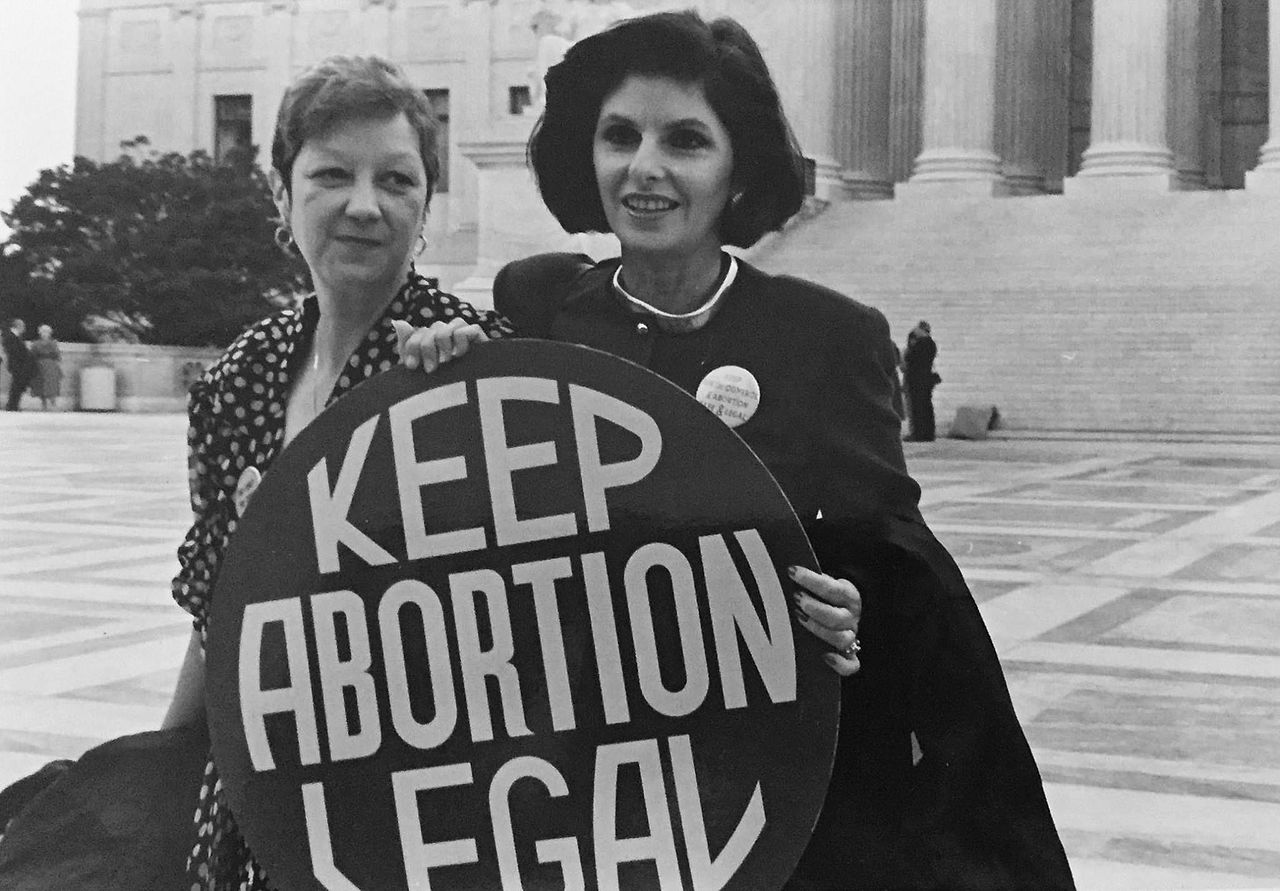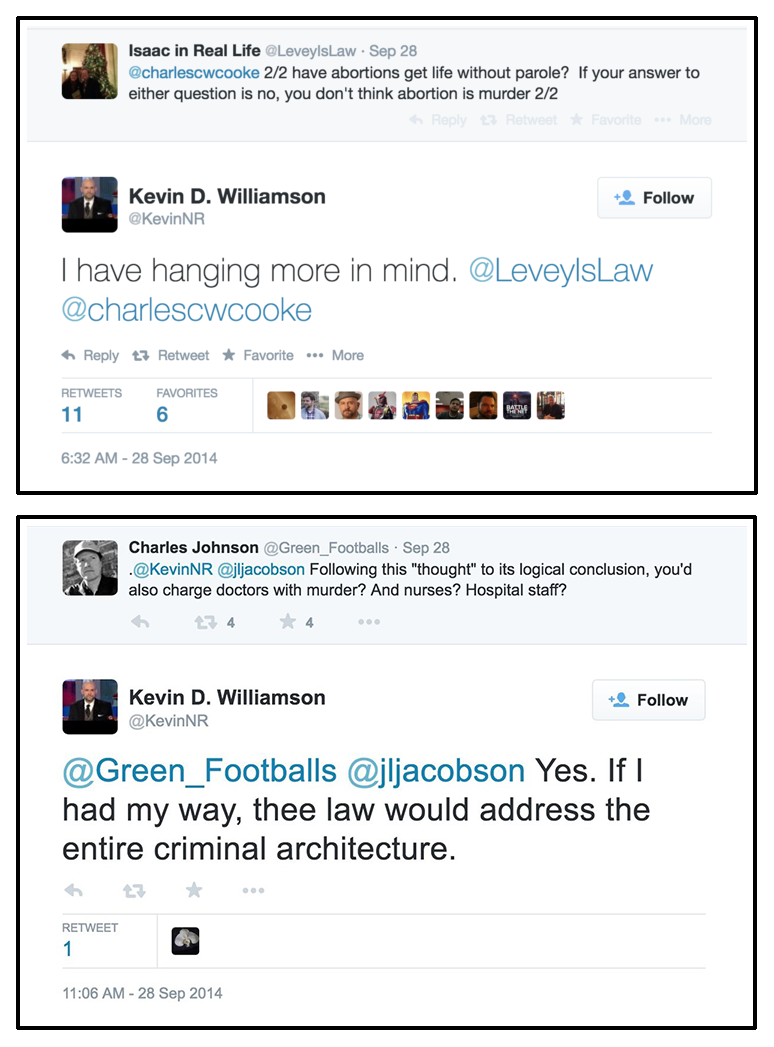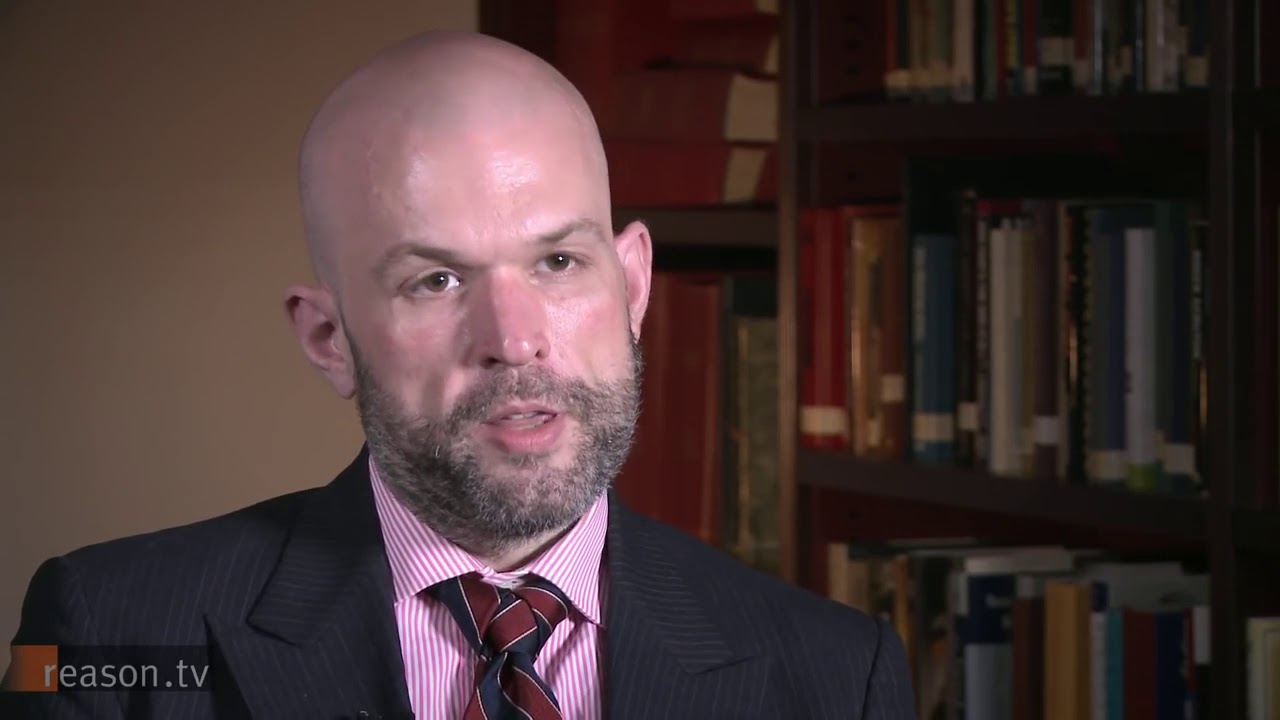Top Stories
Kevin Williamson Is Not a Free Speech Martyr
Are we required to treat this as a legitimate view deserving of an audience and a debate? Or are we allowed to conclude that Kevin Williamson is a callous fanatic?

Just so we’re clear, this is how a hanging works. A gallows is erected, frequently in public. The rope is either long or short. With a long rope, the condemned person drops a certain distance and, at the bottom, her neck is snapped. This is quick and presumably relatively painless – if it works. With a short rope, or a rope not long enough, the person simply dangles by the neck from a loop that constricts her airway and blood vessels. Her hands are bound, so she cannot grasp at the rope. When the instinct to struggle sets in, she flails with her whole body, while she finds herself unable to breathe and while blood is cut off from her head, all of this happening with the force of her own weight cinching the rope more tightly around her neck. Eventually she will pass out, and then die; but first she will likely experience great terror, and probably a fair amount of pain.
The short-rope strangulation is the sort that is used in the common lynching, where the disfavored person is hoisted by the rope as it is pulled over a tree branch. Afterwards, the mob that lynched her will often pose for pictures. The numerous judicial hangings in Iran are accomplished in a similar fashion, but with a rope hoisted by a piece of construction equipment.
Either way, there is the dread that must be experienced by most people as they await and then head to their executions, as the hood and then the noose are placed over their heads, and they stand on the gallows knowing their life is about to end. I find myself empathetic with all but the worst victims of hanging. Saddam Hussein murdered hundreds of thousands and tortured more than could be counted; I don’t care that he was hanged. But on the other end of the spectrum, the people who were innocent – the condemned women of Salem, the many black targets of lynching, perhaps Mary Surratt – trouble me greatly.
Which brings me to Kevin Williamson. Williamson has argued, more than once, that women who have abortions should be hanged. Just among my loved ones, there are several women I know who have had abortions, and probably many others. It is nauseating to think about them undergoing this kind of death. Williamson must also know women who’ve had abortions. If he doesn’t know that he knows such women, he has only to do the math. He then needs to imagine some of the women he knows and loves spending their last moments dreading their deaths, and then being strangled by their own weight at the end of a rope. If he has not pondered the worst consequences of his stated policies and beliefs, then he is not intellectually serious.

But, for the sake of argument, let’s assume he has carefully considered the ramifications of his stated position, and that he is earnestly proposing that women who have abortions should be hanged. Are we required to treat this as a legitimate view deserving of an audience and a debate? Or are we allowed to conclude that Kevin Williamson is a callous fanatic?
Jeffrey Goldberg, the editor of the Atlantic and Williamson’s would-be boss, had convinced himself that Williamson’s first utterance of this policy during a Twitter exchange was a kind of provocation or trolling. Williamson’s decision to delete his Twitter account during the hiring process, Goldberg went on, was “a positive development and a sign of growth” (Williamson is 45, but I suppose it’s never too late to grow). Goldberg claims not to have known that Williamson reiterated his position in a podcast. Upon learning this, he grilled Williamson on the matter, and then fired him.
In a memo, Goldberg explained that, “The language [Williamson] used in this podcast – and in my conversations with him in recent days – made it clear that the original tweet did, in fact, represent his carefully considered views.”
In a partial defense, Cathy Young concluded that Williamson “explicitly disavows” the hanging of women for abortions by pointing to a speech he gave at Hillsdale College in which he says: “I am generally against capital punishment, I am generally against abortion, I am always against ex-post-facto punishment, and always against lynching, I think.” The careful distinction Williamson makes here between “generally” and “always” suggests that when he says “generally,” he actually means “usually,” rather than “universally.” In which case, the only thing I hear Williamson disavowing is the retroactive application of this penalty. His ‘disavowal’ pointedly refers to “women who have had abortions,” and not “women who have abortions.” This translates to: “I am not going to hang you for getting an abortion in the past, I’m just going to hang every woman in the future who does the exact same thing you did.”) Most women will understand that this is a meaningless distinction as far as morality goes. Williamson wants to hang women for abortions; he’s just going to give them fair warning.
I’ve heard nothing to suggest that this policy is purely instrumental, as opposed to retributive. But what if it were? What are we to make of someone who does not believe that certain women deserve to be hanged, but is willing to hang some of them anyway to stop women like them from committing what he sees as a greater evil?
If I thought Williamson might be making a joke – albeit in terrible taste – I’d be more sympathetic; irony is valuable and nothing should be off-limits. But at some point during a firing process it is probably a good idea to admit it was a joke, even at the expense of spoiling it. If Williamson was joking, he was so committed to the bit that he wouldn’t even acknowledge it to save his new job. No one seems to be using the humor defense on Williamson’s behalf, either. The closest they’ll come is that he was trolling – deliberately provoking his opponents with a statement not necessarily representative of his actual beliefs. Yet Goldberg, who originally defended Williamson on those grounds, now reports that his own private conversations with Williamson have convinced him that Williamson was serious. If these are the only two possibilities, it doesn’t matter which one is true. Either Williamson is serious, in which case he is barbaric and doesn’t belong at the Atlantic, or he is trolling, in which case he is intellectually unserious and doesn’t belong at the Atlantic.
I’m of the view that no one actually believes that abortion is murder, because no one actually believes that an embryo is the equivalent of a human. This can be illustrated using the following thought experiment (which is not my own): A fire breaks out in an in-vitro clinic and you only have time to rescue either an infant or a box containing 100 embryos. Whichever you don’t take with you will perish in the fire. If an embryo is a person, then obviously you will take the embryos, because saving 100 persons is better than saving merely one. But, of course, no one would choose to save the embryos over a living baby, because we understand there is a clear difference between the two. You might try to score points for logical consistency by insisting you would save the embryos, but in the moment, you know better. You know what a person is, and you save the only other person in the room.

On the whole, abortion opponents – including most social conservatives – understand this. So, they will say that abortion is murder, but they also understand that punishing a woman for abortion as if it were murder is reprehensible. They will claim that abortion is murder, but will usually allow exceptions for rape or child rape, on the understanding that it would be heartless to force a rape victim or a child to give birth. If they were logically consistent, they would prohibit these abortions, too. You can’t murder someone because his father is a bad person. But that position ignores the humanity of the mother.
Many of the reactions to this controversy reveal a misunderstanding of the job Williamson and others in his position are employed to do. Despite the language used to describe public commentary, Williamson was hired as a thinker, not a writer; yes, he is supposed to write well, but only as a means of communicating thoughts worth reading. All the praise for Williamson’s writing ability suggests that we’d be equally happy to read a well-written defense of Nazism or slavery, and we all know that is not the case – not in the Atlantic, not in National Review, not in anything. Women who have had abortions – and there are millions of them – are entitled to know that we consider their mass extermination equally out of bounds. Apparently, that is not yet the case.
So like St. Paul … I will be an apostle to the Gentiles. I am very much looking forward to raising a brand new kind of hell.
This quote, from Williamson’s valediction at National Review, clearly acknowledges that the Atlantic’s readers are not Williamson’s own people – namely, conservatives. Even in context, these words give the impression of a person with a smug attitude towards those who don’t agree with him. It certainly supports the view of Williamson as a self-identified troublemaker who loves tweaking the squares. Of course, that is how you recruit fanboys, not how you win converts, and unless Williamson shares values with the Atlantic crowd beyond an antipathy to Trump – and it seems he does not – it’s hard to see how he intended to convert them. It must have delighted those who do share values with Williamson to imagine him stalking the pages of the Atlantic, throwing rhetorical bombs and generally wrecking the place. Take that, coastal elites.
Still, the defense of Williamson – or, at least, the insistence that it was wrong to fire him – has been strange coming from other conservatives, and from libertarians. The libertarians, who have included Young, Katherine Mangu-Ward, Robby Soave, and Conor Friedersdorf, naturally favor free debate and Williamson’s right to say whatever he wants. But I would expect that view to be balanced by a belief in the Atlantic’s right to print only what it wants, Atlantic Media’s right to hire and fire whomever it wants, and, above all, the right of a woman to do what she wants with her own body without being killed by the state.
I don't agree with Kevin's abortion views, and I'm not a conservative. But if The Atlantic was actually interested in showcasing conservative ideas–a worthy project for a magazine purporting to value intellectual diversity–he was the perfect person to hire.
— Robby Soave (@robbysoave) April 5, 2018
Since the only thing at stake here is whether Williamson should be paid to work at the Atlantic, I cannot fathom why so many thought this was worth manning the barricades. Friedersdorf, an Atlantic colleague, claims to be just as appalled by Williamson’s position as other critics, but objects to his firing anyway, as if to say that, yes, hanging women for abortions is revolting, but what really threatens society is the way this guy was treated on social media. (Friedersdorf also believes critics need to grapple with the fact that Williamson is the result of an unplanned pregnancy. I look forward to the new libertarian position that personal responsibility counts for nothing and that we are all just the products of circumstance.)
Conservatives should have a different incentive to let Williamson go. Social conservatives who oppose abortion have generally been insistent, at least publicly and institutionally, that women should never be punished for it, much less put to death; recall their appalled reaction to neophyte anti-abortion advocate Donald Trump proposing penalties during the 2016 campaign. If they want that impression to survive, then Williamson is a terrible symbol for their movement and a terrible spokesman for their brand. But the full-throated protest over his firing has allowed him to become both. Social conservatives grousing that one of their kind is unwelcome in the pages of the Atlantic should be aware of what they are proclaiming their kind to be. A conservative like David Frum fits in well at the Atlantic and his columns have produced no such firestorm. But there’s a fundamental difference between Frum’s heterodox views on immigration and the Iraq War, and Willamson’s view that women who have abortions should not be allowed to continue living.
Williamson’s former colleague at National Review, David French, also a former president of the Foundation for Individual Rights in Education, sees in the Atlantic a neutral national institution that should, like the universities French once worked with, serve as a center of free inquiry. So long as writers or scholars can first clear an unspecified threshold for intellect and ethics, they should enjoy maximum freedom to say what they want without fear or repercussion:
Of course, most universities in the US are public institutions funded by taxpayers and governed by the First Amendment; the Atlantic is not. French apparently doesn’t consider Williamson’s support for hanging women a failure of either intellect or ethics. And French arbitrarily exempts his own employer from the standards of impartiality he demands of the Atlantic; National Review can enforce an ideological standard, but the Atlantic cannot. But what is the point of NR’s ideological standard? National Review caters to a specific audience; this is in fact the business model of any media outlet. French is insisting that the Atlantic cannot take business concerns – audience preferences or possible audience attrition – into account when staffing and publishing, but must act in the public interest. French must realize that the Atlantic is not supported financially by conservatives. It is supported by the political center and the Left. There seems to be an assumption embedded in this view that the center-Left must offer even-handed analysis while the Right should be free to publish partisan polemics.
Williamson’s defenders, like Friedersdorf, have sometimes painted a picture of his critics trawling his every word looking for something incriminating with which to assassinate him. There was no need for that, though. As a provocateur, Williamson often generated controversy in real time, including with his abortion tweets. For example, he notoriously described a black child thus:
He glances slyly from side to side, making sure his audience is taking all this in, before raising his palms to his clavicles, elbows akimbo, in the universal gesture of primate territorial challenge. Luckily for me, he’s more like a three-fifths-scale Snoop Dogg, a few inches shy of four feet high …
Williamson claimed innocence on the inclusion of the historically-loaded fraction. And speaking about economically depressed, predominantly white small towns, he wrote the following:
Even the economic changes of the past few decades do very little to explain the dysfunction and negligence – and the incomprehensible malice – of poor white America. … The truth about these dysfunctional, downscale communities is that they deserve to die. Economically, they are negative assets. Morally, they are indefensible.
Such statements, whether you would condemn them or not, were not issued in stealth. It’s far more reasonable to suppose that his critics didn’t have to scrounge around for ammunition. Hanging women for abortion is the kind of thing that some people – women, let’s say – remember.
There’s a strong suggestion in all of this that Williamson’s firing is the triumph of political correctness or liberal intolerance – that civil discourse requires an open mind and a welcoming spirit of inquiry, and that the political Left, which preaches such things, has failed badly in this instance and shown the most blatant hypocrisy. That point of view is, to be blunt, rubbish. It is the cheapest manipulation to invoke tolerance in defense of someone who advocates the gruesome execution of a sizable fraction of our society. How tolerant is hanging, exactly? Of course, Williamson’s defenders could point out that the women in question are taking physical actions, and he is just talking. Those women might justifiably note in return that they have only advocated that he lose his job. He is advocating that they lose their lives. He is arguing that they, let me say it again, be strangled at the end of a rope.
Williamson is free to advocate for anything he chooses. That was true before he was hired by the Atlantic, it was true during his short time there, and it remains true now. No one is calling for his prosecution, which by itself distinguishes Williamson from his critics. But there was an opportunity cost to Williamson’s job at the Atlantic. He was to be given money and an awful lot of page space, and both of those things are finite. Every dollar and column-inch could have gone to someone else, and given our current media market, it’s not possible to believe, knowing what we now know of him, that they could not have gone to someone more deserving. It is perverse to say that, having mistakenly offered money and space to Williamson, the Atlantic was bound to give him both in perpetuity. His hiring was a mistake; his firing is easily defensible. If his family must now pick food from trash cans, perhaps Atlantic Media owes him some financial support, but under no circumstances should our pity extend to his place in the pages of the Atlantic. That’s neither an entitlement nor something he can’t live without.
For all the gusto to produce the definitive contrarian take, no one has yet offered a convincing case that the Atlantic’s readers should put up with Williamson’s cold, murderous contempt for so many of them, in preference to someone else it could be publishing. The readers of Quillette despise an online mob, I’m sure. But Kevin Williamson wasn’t the victim of an online mob. He was the victim, if he can even be called that, of his own extremism. He stated his view, repeated it, defended it, passed up every chance to explain or renounce it, and was then fired for it, and from a job in which an employee’s views are the actual work product. He should never have been hired. But, having been hired, it is far better that he was fired quickly than allowed to continue a career as a thinker, that was given to him without realizing what kind of thinker he is.






